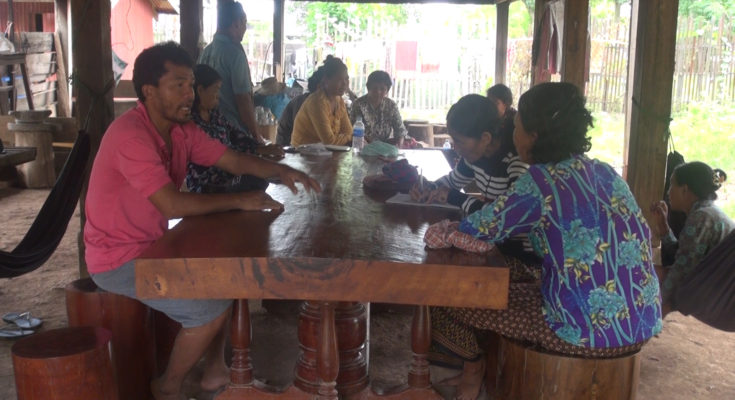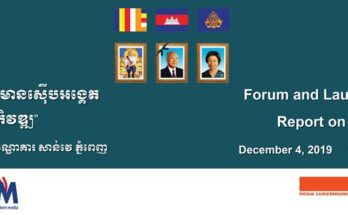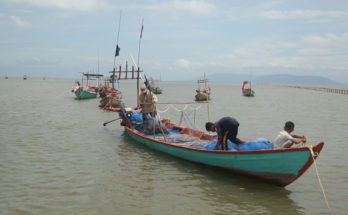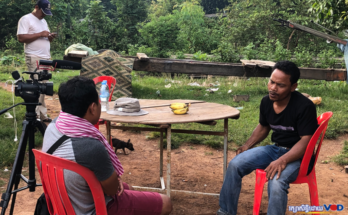People in about 25 villages in the 10 communes, located in three districts, including Chhep, Tbeng Meanchey, and Chey Sen districts, have been severely affected by five Chinese companies’ projects. There are several villages in the area affected by the investment project, including Preus Kaak village in Chhep district where the companies have cleared the land to the edge of the villagers’ land.
Mr. Iem Aon, community representative for Preus Kaak village in Chhep district said “Since late 2011, they have cleared the land around the village and left a distance of less than 10 meters from the rice field dike, and currently, the community people in my village are facing great difficulties”.
Mr. Iem Aon reported that the Chinese companies’ investment has not helped to improve the people’s livelihoods. “Almost 90 percent of the people in Mlou Prey 2 village have fallen into debt to a bank”, he added. “I borrowed money to buy petroleum to grow rice. Before the company’s arrival, we were able to hunt wild animals and sold them for petroleum, or liquid resin, dry resin, or orchids, or ginseng, or sticky rice for sale in exchange for the petroleum. Now, we are not able to find them, so we are forced to borrow money from the bank. Being in debt to the bank, if there is a drought and we cannot grow rice, we will probably sell domestic property for those who have them, but it will be difficult for those who don’t have any property to sell”.
Mr. Heng Phuon, Chief of Mlou Prey 1 village, acknowledged that the people have actually borrowed money from the bank and used it as capital to enhance their livelihoods. “Before the Chinese companies’ arrival, people were not in debt to the banks like today”, he added.
Prime Minister Hun Sen attended an opening ceremony for a cane sugar company, Rui Feng, on July 19, 2016. He stated that about one hundred to four thousand local people would become the labor force for these Chinese companies. “His company will become a market for sugarcane farmers. A lot of people are growing rice and receive a low yield, so the factory owners should build connections with them, asking them to grow sugarcane and buying sugarcane from them for the factory”.
Mr. THEAN Heng, Chief of Premeru commune, Tbeng Meanchey district, denied that any people had gone to work for the company. He added that the community group wanted to work for themselves, not for the company. He said “Before the company wanted a deal like this, but our villagers declined. I speak neither for the company nor villagers, but our villagers don’t want to work for anyone”.
A research report by Ponlok Khmer Organization in Preah Vihear province finds that the quantity of resin tree, which is one of the core occupations for the ethnic groups, has declined. The report also indicates that the community has gradually stopped ordering the products from villagers after the company came to clear the forests and the land owned by the Kuoy ethnic group.
The report also reveals that the villagers’ sales of products to the community for December 2010 was up to 27 million riels (27,328,000 riel). If compared with the last five months of 2016, it was only over 13 million riels (13,167,000 riel). The community workshop in Prameru commune, Tbeng Meanchey district, was forced to shut down. However, other communities in Chhep and Chey Sen districts that once earned income from non-timber forest products and other resources have also lost out.
Mr. Sith Savorn, representative of Prameru community, Tbeng Meanchey district, states that the main reasons for the community to stop ordering resin from the villagers is that there are no more resin trees to produce it. Meanwhile, Mr. Pin Chey, 40 years old, who used to buy resin from the Prameru village community, Tbeng Meanchey district, reported that he had stopped doing this work since the Chinese companies came to invest. “I abandoned this work because the company had cleared the forest that used to produce resin for the community”, he added.
Mr. Sun Veasna, broker, living in Bos Thom village, Tbeng Meanchey district, reported that before 2012, he purchased from 50 to 60 containers of liquid resin per day, but this quantity had dropped to only 5 to 10 containers per day at the present time (1 container = 30 liters). He said “this decrease is due to the fact that the trees have been cut down while the price goes up and down based on market price”.
Living in Tbeng Meanchey near the other two districts, Ms. Sing Set who reported this vulnerability due to the Chinese companies’ investment said that like other families, her family no longer has access to forests to look for forests products like before. She added that to earn money for surviving, some family members are forced to migrate while some other people are hired to transplant paddy rice in the wet season. “If I had a few resin trees, we would share them. When we have disputes, I have nothing to cover my home. We had to leave our village. We only want a home”.
A letter from the Office of the Council of Ministers, dated February 8, 2011, signed by Prime Minister Hun Sen, permits five Chinese companies to invest in these three districts. An investigation report from five NGOs and associations in Preah Vihear province, issued in June 2017, reveals that Heng Yue, Heng Rui, and Heng Non companies obtained investment licenses on the same day, November 8, 2011. These three companies including Lan Feng and Rui Feng have only one office in Phnom Penh. These three companies have been authorized to invest in over four hundred thousand hectares of land in Preah Vihear province.
Mr. Veng Sokhon, Minister of Agriculture, Forestry and Fisheries acknowledges that the companies have violated the principle approved on some occasions. He said “the procedure is good, but there are some shortcomings. Sometimes it is cleared before time, so it causes impacts”.
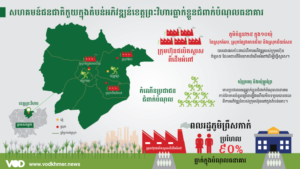
Article 59 of the 2001 Law on Land states that the economic land concession shall not exceed one hundred thousand hectares. This law also has a provision that it is permissible to grant various areas of economic land concessions to only one person or several legal entities, but it is to be controlled by a natural person or legal entity with the size of land permitted by the law.
A private company, Green Environment Group, that conducted a comprehensive environmental and social impact assessment in July 2016, confirms that the paddy and farming land of people concerned in the project area will be completely removed or exchanged with the people at a reasonable price accepted by them. The report also confirms that the companies are required to keep the forests on both sides of the canal up to at least 100 to 150 meters wide to prevent soil erosion. In addition, the company shall keep the spiritual and traditional land and three areas of temple land located in the project area.
On the contrary, Ms. Khiev Him, residing in Meru village, Tbeng Meanchey district, denied that the villagers had not been informed of the development. She said the companies cleared the people’s land without any information or consultation. “They had not informed us that they would plant sugarcane or they would cut some areas of land. We tried to stop them when we saw the bulldozers. When we asked the workers, they said they had been permitted by Samdech Prime Minister Hun Sen and the village, commune, and district/khan authorities”, she added.
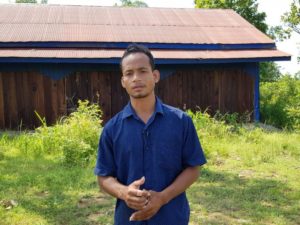
The report from the five NGOs and associations also reveals that the five companies, Heng Rui, Heng Yue, Rui Feng, Heng Non and Heng Yue, are the subsidiaries of Hengfu Group Sugar Industry, referred to as Hengfu. The CEO of the parent company, named Feng Liu, is in Guandong, China. However, there is no mention of this company in the investment letter issued by the MAFF.
The report also reveals that Hengfu and Hoda have received capital from Chinese banks, including a French bank, Bank BNP Paribas, and the Korean Development Bank. Moreover, the Oversea-Chinese Banking Corporation (OCBC), which is a prominent bank in Singapore, is also a shareholder of Hoda. The same source also reveals that Rui Feng has constructed a cane sugar factory in Chhep district with investment capital of 360 million dollars. Based on a report issued in June 2017 by the five NGOs and associations, it has been found that this is the largest cane sugar factory in Asia with a production capacity of 2000 tons of sugar per day.
A joint report by the communities affected by the Chinese companies’ projects requesting intervention, dated August 25, 2017, states that the companies have abused human rights and indigenous people’s rights, in particular they have destroyed the environment, economy, and culture. The report also reveals that the affected communities have requested the government to stop leasing the land to those five companies. In particular, they have to return the land and compensate for the loss of the biodiversity in the communities.
A community development official at Ponlok Khmer Organization, Mr. Sophoan, is of an opinion that the forest byproducts and decent occupations, such as collecting vines and Prich leaves, are a way for the locals to earn their living. The same source also reports that to address this problem, the government must stop granting economic land concessions that cause adverse impacts like this. “Without a preventive measure, the communities will not earn any income. We depend on rain to grow rice. If it does not rain because of the reasons linked to the loss of forests, people will not be able to grow rice. If they raise chickens, ducks, pigs, and cattle, they will not receive any return. Why? Because they have no land to tend the animals on”, he said. Mam Moniroth
(This report is written by Mam Moniroth contracted under the project of CCIM supported by Rosa Luxemburg Stiftung)

